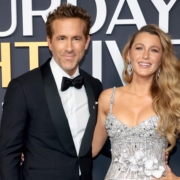When the Curtain Falls on Gossip and Glamour: A Mom’s Perspective on the Blake Lively and Justin Baldoni Lawsuit
I wasn’t going to write about this.
Not because I don’t have thoughts—God, I do. But because most of the time, I’m too busy navigating real life to spare the energy. My days are full. Loud. Sometimes lonely in ways that have nothing to do with being alone. My husband, a stay-at-home dad and the steadiest soul I know, does the heavy lifting at home so I can work. And together we hold the center of our world: our children: two girls, one boy.
One girl is seventeen. Curious, skeptical, fierce, and observant in a way that’s both terrifying and beautiful.
The other is six. She has Pitt Hopkins Syndrome—a rare neurodevelopmental disorder that has rewritten everything I thought I knew about time, language, and strength.
They are night and day. Fire and light. And they are the reason I can’t help but pay attention when powerful women play dangerous games with the truth.
That’s what pulled me into the Blake Lively and Justin Baldoni lawsuit. That, and the low thrum of unease I feel when feminism becomes branding. When trauma becomes marketing. When the truth gets massaged beyond recognition.
Blake filed a complaint. Then a lawsuit. Justin countered with one of his own—$250 million and a vault of text messages. It’s all very Hollywood. Big. Messy. Glossy. A bonfire of reputations.
But beneath it all, I hear something else: the quiet crackle of something sacred being cheapened.
She says he crossed lines—whispered off-script things, improvised touches, made her feel old and fat and vulnerable. He says she invited him in. Literally. That she texted him while pumping breast milk in her trailer and asked him to come rehearse.
She calls it harassment.
He calls it manipulation.
And I sit here, watching from the far edge of it all, asking myself how to raise two girls in a world where the line between truth and theater keeps shifting under our feet.
The thing is, I never though much of Blake Lively. Didn’t like or dislike her. I knew nothing of her. I thought of her as simply Hollywood. Beautiful, controlled, marketable. But this lawsuit—this performance, if I’m honest—has made me feel something I didn’t expect:
Disappointment. Deep, bone-weary disappointment.
Because if there’s one thing I know, raising a child with profound special needs and a teenager who’s learning how to navigate a digital, image-obsessed culture—it’s that words matter. That how we name things shapes what we believe. That calling a birthing video pornographic to support a narrative isn’t just manipulative—it’s destructive.
I’ve given birth. Three times. I’ve watched my husband hold our daughter as she had gastritis screams. I’ve sat in neurologist offices hearing words I didn’t understand, then went home and Googled until the screen blurred. I’ve watched both my daughters fight for different kinds of voice.
So no—I don’t take kindly to seeing trauma turned into spectacle.
When Blake Lively’s complaint leaked—within 24 hours of being filed with a civil rights board, no less—it felt rehearsed. The headlines came fast. The New York Times ran the piece with just enough shading to bury Baldoni before the public could ask too many questions. But people did ask. Because we’ve been here before. Amber Heard taught us something. Maybe not enough—but something.
So Blake doubled down and filed an actual lawsuit.
And now here we are: a media circus, a countersuit, a war of screenshots. Her team says she was violated. His team says she weaponized the story for sympathy and image rehab.
I’m not a judge or a lawyer. I’m a mother. But I know what it means to protect your child. To show them how to discern, to trust, to step back when something feels wrong—even if it’s beautifully packaged.
And what feels wrong is the way this whole case bends the narrative around Blake’s desirability—either she’s so irresistible Baldoni couldn’t resist pushing boundaries, or so repulsive he mocked her postpartum body. Which is it?
What feels wrong is how carefully the language is designed to trigger sympathy—referring to an “underage character” in sexually charged scenes, even though the actress is 23.
What feels wrong is this slow corrosion of credibility, where every painful experience becomes content, every allegation becomes strategy.
There’s a Barbie on the floor again. My youngest daughter left her there. Face down, one leg twisted underneath her, as if she gave up mid-play. There’s a half-folded IEP update under my coffee mug. I haven’t had time to read it yet. My husband is in the next room, laughing softly as he helps our daughter practice a communication app that speaks her choices aloud. Her voice, pixelated and robotic, still feels like a miracle.
And somewhere, on my phone, a new headline scrolls past.
I believe in women. But I also believe in caution. Nuance. Evidence. And the hard-earned right to say, “I’m not sure.”
Because the world my daughters are growing up in doesn’t need more noise. It needs honesty. Integrity. And the wisdom to tell the difference between a woman in pain—and a woman selling a version of herself that will play well in the press.
Not everything is worth cleaning up.
Not everything comes clean.
And not every performance deserves applause.




Leave a Reply
Want to join the discussion?Feel free to contribute!